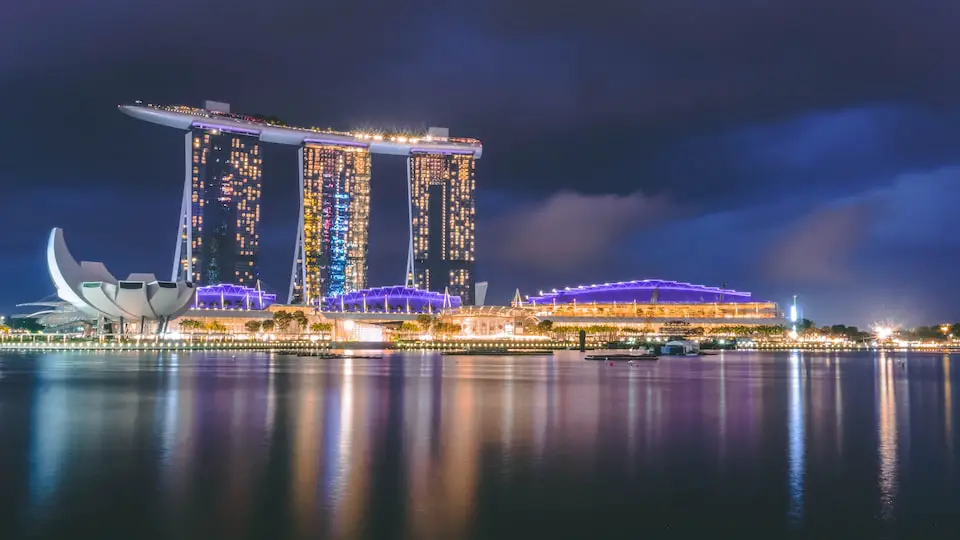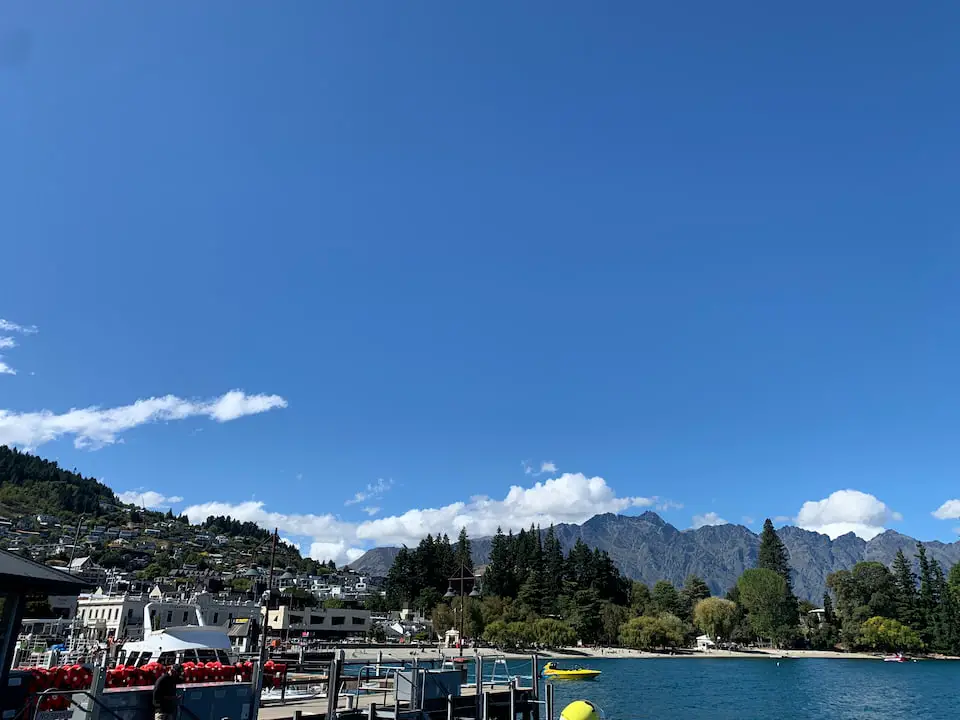New Zealand vs Singapore: Best For Living And Immigration [2024]

Are you considering options for living and immigration? New Zealand or Singapore, don’t know which to choose? Both countries are highly popular among foreigners thanks to their climate, job opportunities and international atmosphere.
New Zealand and Singapore have some similarities, but they are very different in terms of culture, climate, and standards of living. Singapore is a very small but incredibly well-organized country, while in New Zealand, you will have much more space to yourself.
The most challenging thing to do in life is to decide where to live, especially if the choice is between New Zealand and Singapore.
New Zealand is a clean and diverse place with incredible natural beauty you won’t find elsewhere. At the same time, Singapore offers an incredible city life and higher salaries.
So, New Zealand vs Singapore? You need more than just a few casual details. In this article, we list several points you should consider. You will read about the similarities and differences between New Zealand vs Singapore and find out which one wins.
Continue scrolling to know where and how each country scores the goal for livelihood and immigration.
Living in New Zealand vs Singapore

New Zealand is located in the island world of Oceania in the southwestern Pacific Ocean. Singapore is situated miles away in the South-Asian continent, right at the top of the renowned Malay Peninsula.
With a distance of approximately 8,529 km, which accounts for a 9 hours and 47 minutes flight between the two countries, it’s hard to imagine the similarities and differences.
Several factors like the quality of life, income, weather, climate, and the cost of living play a role in your decision to settle for good in either of these countries.
Below is a comprehensive picture of the differences and similarities between New Zealand and Singapore and which one could be the best choice for you.
One is clear when you land in New Zealand, nothing ever feels the same again, so New Zealand it is!
Quality of life
The quality of life or well-being of a country is defined by multiple factors such as political stability, civil rights, healthcare, climate, cost of living, and popularity. The statistical data analysis about the well-being of both New Zealand and Singapore suggests even odds for both.
New Zealand has a higher rate of political stability as compared to Singapore. On a scale of 1-100, New Zealand is at an excellent percentage of 90, with Singapore following right behind with 84% stability.
The government of both countries has put a lot of emphasis on granting civil rights to the citizens, with New Zealand having a complete 100% on the scale and Singapore catching up at 89%.
In terms of health, both countries have very good values on the spectrum. Although New Zealand is winning in this category with a lead of 81%, Singapore is not so far behind with just a difference of 2% which makes it fall at 79%.
Hence, people in both countries can rely on their public healthcare systems. Generally, you can live a pretty healthy life either in New Zealand or Singapore.
For some reason, the climate is a pretty unsatisfactory factor for most people in both countries. Surprisingly, neither Singapore nor New Zealand can live up to the mark of at least 50% of the citizens being happy with the weather conditions.
That said, Singapore and New Zealand have very different climates, average temperatures, and humidity.
For a Caucasian or European person, New Zealand’s climate is easier to adjust to. Most of the country belongs to the temperate zone, similar to Europe.
Singapore has typical South Asian weather, e.g., hot, wet, and humid. It’s a tropical climate, with average temperatures of around 30 degrees Celsius and 84% humidity year around.
Learn more about the qualify of life in New Zealand in our YT video:
Cost of living
Settling in and living a comfortable life in a new country requires a balanced cost of living; otherwise, it would seem like experiencing an actual survival game.
But before taking a step towards your decision and your destination, it wouldn’t hurt to check whether you can afford the shift from your current lifestyle to the cost of living of the new place.
It might come as a surprise, but you will need significantly more money to live in Singapore than in New Zealand, even if we take into account its most expensive place like Auckland.
According to statistics for 2024, you will need about US$9,201 per month as a family of four in Singapore, while this number is only US$4,801 in New Zealand.
Also, the EIU Cost of Living 2021 survey has indicated that Singapore is the second most expensive city in the world.
However, both countries have approximately the same average living costs apart from rent. Only housing is significantly more expensive in Singapore, averaging at about US$4,000 for a two-three bedroom apartment.
In New Zealand, a single person requires NZ$3,000 – NZ$4,000 (US$1,897 – US$2,530) per month. As for a family of four, a decent lifestyle means spending between NZ$5,000 – NZ$6,000 (US$3,162 – US$3,795) per month.
Read the full guide on the cost of living in New Zealand.
A comparative description of different expenses in Auckland (the most expensive city in New Zealand) and Singapore:
| Consumer prices in Auckland are 7.4% lower than in Singapore (without rent) |
| Consumer prices, including rent in Auckland are 31.2% lower than in Singapore |
| Rent prices in Auckland are 55.4% lower than in Singapore |
| Restaurant prices in Auckland are 30.9% higher than in Singapore |
| Groceries prices in Auckland are 2.1% higher than in Singapore |
| Local purchasing power in Auckland is 1.5% higher than in Singapore |
A breakdown of the average typical expenses when living in New Zealand and Singapore:
| Expenses | Singapore | New Zealand |
|---|---|---|
| Rent for 3 bedroom apartment | US$4,073 – 6,342 | US$1,956 – 2,435 |
| Water bottle | US$1.04 | US$2.11 |
| Internet | US$35.5 | US$54.3 |
| Utilities | US$152 | US$148 |
| Transportation (monthly pass) | US$96 | US$134 |
Visa and permanent residency
New Zealand has different visa categories, such as work, study, visit, and investing. Singapore also offers various visa options for work, study, visiting, and much more.
Although the processing times of almost 12 to 14 months are nearly the same for both countries, the fees and ease of immigration are different. New Zealand has comparatively higher visa fees, but Singapore takes over with its easy process.
For instance, a temporary New Zealand work visa requires you to have a referral or an employment offer from a New Zealand employer. The other points to qualify include skills, qualifications, work experience, and health requirements.
In the case of permanent residency, New Zealand is welcoming to all. Different ways to obtain a PR visa include a skilled migrant visa, straight to a residence, a partner of a New Zealander, a long-term skill shortage, or a post-study work visa.
Learn how to become a New Zealand citizen.
Singapore allows gaining access to a permanent resident visa by investing there, establishing a business, marrying a citizen, studying, or being a Permanent Resident for a minimum of two years.
If you have been residing/living on a visit visa or a study visa for a prolonged time of a maximum of 3 years (of which, at least one year as a PR), you are eligible for citizenship as well.
Generally, getting citizenship in both countries is a pretty realistic idea, but for skilled workers, it might be easier in New Zealand.
Job opportunities

No matter where you are in the world, there is always a fair amount of competition and struggle in acquiring a job.
That said, moving to New Zealand or Singapore can open up a world of job opportunities for you, and salaries are decent.
New Zealand’s job market depends on experience and skills rather than qualifications and degrees. Job culture over there is open-minded and accepts anyone fulfilling the criteria regardless of your nationality.
Jobs are available in different fields, such as medicine, the IT sector, construction, and trade. Immigrants have many choices from healthcare, electronics, telecommunication, agriculture, and forestry.
A recent OECD report states that almost 77% of employable individuals in New Zealand have landed a job which makes the job market renowned throughout the entire world.
The only downside is that since New Zealand has a significantly lower population than Singapore with a difference of almost over one million, the job pool is slightly smaller.
According to the Expat Insider Survey 2019, Singapore was placed 8th for job security. Although the job market is very competitive and demands a lot, it makes its name by being very welcoming, valuing foreigners, and offering a range of options to choose from.
Expats and foreign workers can find the most job offerings with their skills and consider these tips:
- Networking and making connections
- First impressions by a Singaporean style CV
- Keep in mind the work culture by being polite, watching your body language to be accepting and being grateful.
Work culture
To succeed in any official workplace setting, it is essential to understand the workplace culture of that country.
In a single sentence, the work culture of New Zealand is innovative, expressive, self-dependent, globally-accepting, and values both the managing directors as well as the junior employees.
The work culture of New Zealand is very welcoming, relaxed and open-minded. The work balance stays above career achievements.
Besides, it emphasizes skills and communication to get the job done. You won’t be guided, as it’s the case in Asian work culture, but instead will rely on yourself.
Typical office etiquette in New Zealand includes punctuality, a smart semi-casual-formal dress code, and introducing oneself by first name.
As opposed to the presence of a standard set of skills, what keeps the work culture of New Zealand in balance is the socialization and hierarchical organization of the members of the workforce.
Everyone, no matter their age or position, is allowed to express their opinions in any situation. That’s a big difference when compared to the work culture in Singapore.
Singapore
If you are considering moving to Singapore, you are in for a rollercoaster ride with their cultural beliefs and values.
There are plenty of things you will have to learn as a non-Asian. For example, giving someone your’s business card with one hand is considered rude or impolite; you should do it with both instead.
Singaporean work culture is a liberal and more open-minded version of the liberalist Asian culture.
It appreciates a hierarchically organized system based on the level of ranking of employees and teamwork and collaboration. In contrast to New Zealand, the Singaporean work culture prioritizes group achievements above the individual.
A dress code is typical business attire. Formality and respect are considered important factors over which conflict may occur. Strict workplace rules and orders are given with no exceptions to govern the workplace.
Unfortunately, Singaporeans are known to be hard-working and workaholics, hence, you might struggle to establish a good work-life balance when working there.
Salaries

If you are looking for an opportunity to settle abroad, one of the most important things you need to know about is the local salary and the average earnings.
From what a good income is to how it varies according to different criteria and merits — everything matters because this decision will shape your lifestyle.
New Zealand
A good annual salary in New Zealand is approximately between NZ$70,000 (US$42,701) and NZ$80,000 (US$48,802) before the deduction of taxes. Read our guide on salaries in New Zealand.
This accounts for a net per month of NZ$4,579 (US$2,745). If you live alone or with a family, this salary can satisfy your basic needs and leave some pleasures and leisures.
Certainly, the salaries vary with varying occupations. But the average salary (across all fields) in New Zealand as of 2022 was a sum of NZ$58,836 (US$37k) per year.
In order to make an accurate estimate of the salary, keep in mind that a median income is about NZ$27 per hour (2021), which basically accounts for NZ$56,160 per annum based on a 40-hour week. Also, the minimum wage is set at NZ$21,20 per hour (in 2023).
However, don’t expect to save a lot of money and buy a house easily – salaries in New Zealand aren’t on the high side.
Singapore
As per the competitiveness in the job market, Singapore has an average salary of SG$56k (US$42,000). As of January 2023, the average salary in Singapore is SG$6,622 per month or SG$79,200 per year. That comes to almost US$60,000 annually.
This makes it far better than the average salary in New Zealand, considering that the cost of living is the same. Win, win for Singapore!
Most guesses lead to the result that almost 5% of Singaporeans constitute the world’s richest community. You might not be there yet, but dream big, aim high, and work hard — and you have it in the palm of your hand!
To compare wages in both countries, here are the average annual salaries for different industries and jobs in New Zealand:
| Industry | Average salary (NZ$) |
|---|---|
| Administrative personell | 89,799 |
| Childcare & education | 75,938 |
| Construction & maintenance worker | 65,637 |
| Project manager | 97,524 |
| Primary school teacher | 75,130 |
| Carpenter | 56,900 |
| Healthcare, pharmaceutical & social services | 93,885 |
And annual wages for various positions in Singapore:
| Job title | Salary range | Average |
|---|---|---|
| Software engineer | S$28k – S$97k | S$59,363 |
| Project manager | S$35k – S$125k | S$75,469 |
| Account executive | S$15k – S$48k | S$35,018 |
| Senior software engineer | S$47k – S$124k | S$83,205 |
| Marketing executive | S$23k – S$48k | S$36,056 |
| Operations manager | S$26k – S$124k | S$66,938 |
| Marketing manager | S$26k – S$127k | S$71,378 |
Taxes
Now the question is, where do people give up half of their income back to the government? We all know how painful it can be to pay taxes. Which country requires you to pay more tax and which allows you to save more?
New Zealand
For New Zealand, as of the year 2023, the following income tax rates are applicable:
| Salary (NZ$) | Tax rate |
|---|---|
| Up to $14,000 | 10.5% |
| Over $14,000 and up to $48,000 | 17.5% |
| Over $48,000 and up to $70,000 | 30% |
| Over $70,000 and up to $180,000 | 33% |
| Remaining income over $180,000 | 39% |
That said, an average single worker pays about 19,4% of their income in taxes.
Singapore
The income tax rates in Singapore depend solely on the residency status of an individual. Under certain conditions, you shall be subject to paying tax for a particular assessment year (YA).
Resident taxes apply to you if you are a:
- Citizen of Permanent Residence of Singapore
- A foreigner who has stayed or worked in the country for a minimum of 183 days in the last year.
- Stayed or worked as a foreigner continuously for 2 consecutive years.
Whereas the non-resident taxes are applicable as such:
- On employment income
- On director’s fees, consultation fees, and any and all other income
Tax rates YA 2023- 2024 for residents are as follows:
| Chargeable income | Income tax rate |
|---|---|
| First $20,000 Next $10,000 | 0 to 2% |
| First $30,000 Next $10,000 | – 3.50% |
| First $40,000 Next $40,000 | – 7% |
| First $80,000 Next $40,000 | – 11.5% |
| First $120,000 Next $40,000 | – 15% |
| First $160,000 Next $40,000 | – 18% |
| First $200,000 Next $40,000 | – 19% |
| First $240,000 Next $40,000 | – 19.5% |
| First $280,000 Next $40,000 | – 20% |
| First $320,000 In excess of $320,000 | – 22% |
Generally, income taxes are pretty low in Singapore, and you are likely to pay less in Singapore than in New Zealand.
Weather and climate

New Zealand and Singapore are situated on opposite sides of the hemisphere, with the weather and climate being polar opposites of one another. Where Singapore remains humid and has a tropical climate all year long, New Zealand has varying climate zones, with most of it being a temperate climate.
New Zealand has a unique climatic atmosphere, with the weather changing in all directions of the land. If you want to select or move around in the same country to experience different climatic zones and weather, New Zealand is the right choice for you!
Northern New Zealand is the sub-tropical climate zone with endless summers and beaches! The best part is that it never gets too hot because we can all agree that too much summer is definitely unbearable.
On the other hand, the South Island is a dry climatic region with winters all year around. Cooler regions have snow and glaciers as well. So, New Zealand offers a range of temperatures for you to make your choice.
On the other hand, Singapore is situated near the equator and has the most unbearable combination of climates you would never want. No, but seriously, constant rainfall and high and humid temperatures all year long? We are sorry, but New Zealand wins this time.
The cherry on top is that Singapore doesn’t even experience all four seasons. It just goes from summer to spring and back to summer again. Commonly, the climate is known to have two monsoon seasons.
The Northeast monsoon begins in December and lasts till early March, and the Southwest monsoon extends from June to September.
The major weather systems range from monsoon surges and strong winds to Sumatra squalls and sea breezes.
Hope this summary of Singapore vs New Zealand was helpful and you are now well aware of which country is better. PS: It might be New Zealand 🙂
Also read our country’s comparison between living in Canada vs New Zealand.


![Flight Time To New Zealand From Different Parts of The World [2024]](https://simplenewzealand.com/wp-content/uploads/2023/05/Air_New_Zealand_Airbus_A321-271neo_ZK-NNB_landing-1-768x432.jpg)

![New Zealand vs UK: Which Country Is Better For Living? [2024]](https://simplenewzealand.com/wp-content/uploads/2023/01/andreas-sjovall-ZZUPu8ARD8U-unsplash-768x432.jpg)

![17 Best And Worst Suburbs in Christchurch [2024 Guide]](https://simplenewzealand.com/wp-content/uploads/2023/09/Park-Hagley-CHCH-768x512.jpg)
![Why Are People Leaving New Zealand? [2024]](https://simplenewzealand.com/wp-content/uploads/2023/03/romain-v-ndfQe4ZR_qg-unsplash-1-768x513.jpg)